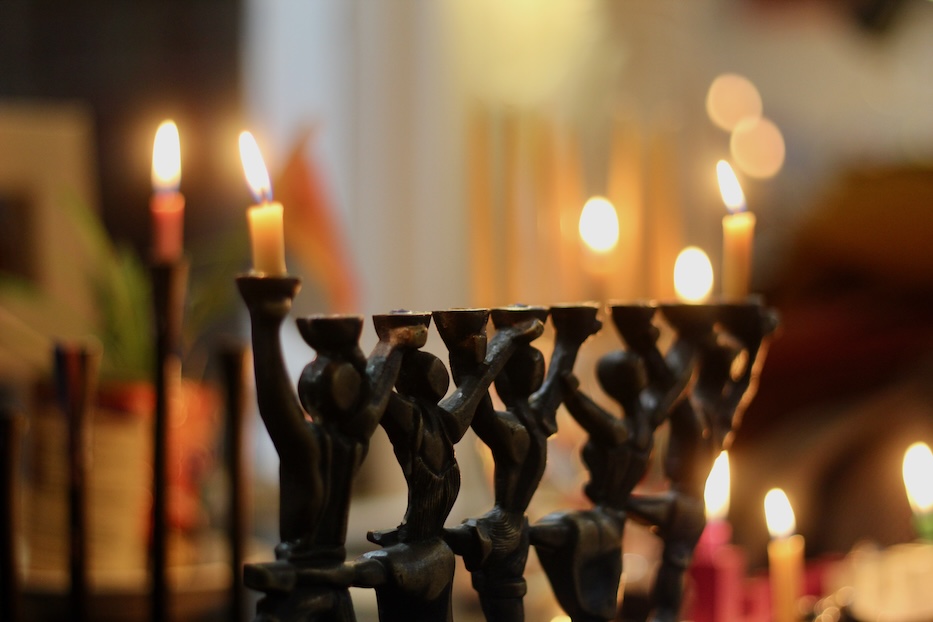
Culture & Community | Faith & Spirituality | Music | Arts & Culture | Whalley/Edgewood/Beaver Hills | Possible Futures
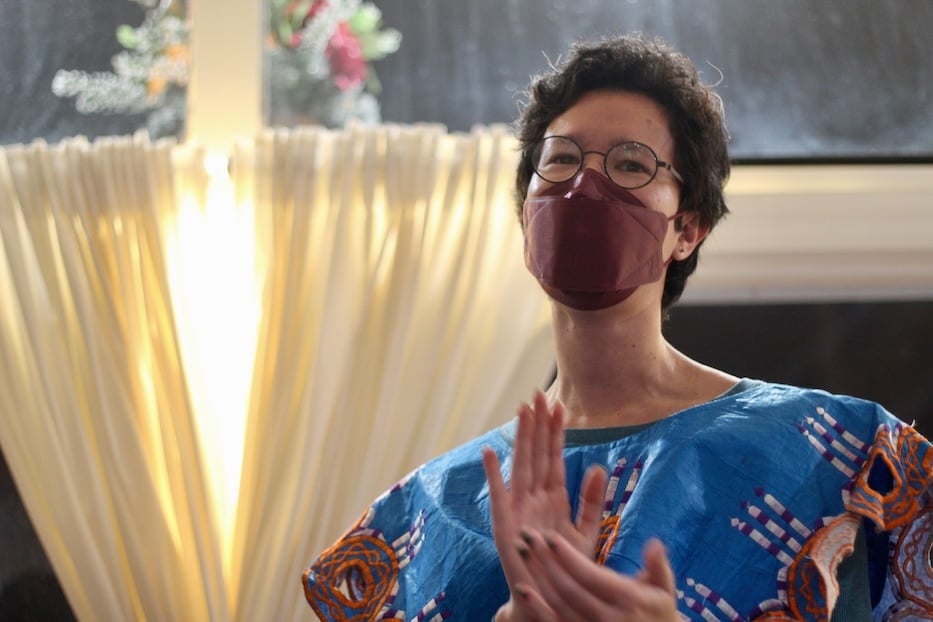
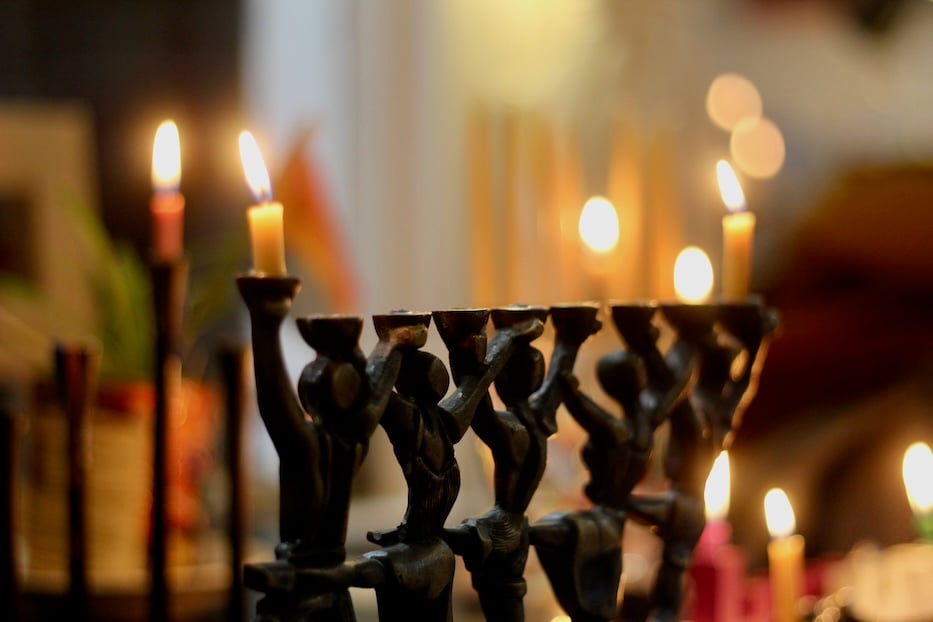
Rabbi May Ye: "This year feels like a really dark time—the light is decreasing right now. And yet, there will still be one light at the end." Lucy Gellman Photos.
The lyrics to "Lo Yisa Goy" wove through Possible Futures, carried on gentle guitar and trilling trumpet. "Lo yisa goy/El goy cherev/ Lo yil'medu/Od milchamah," the words began, soaring over copies of J is for Janucá and Herschel and the Hanukkah Goblins. At the front of the room, two toddlers rose and started to dance, their little knees bending on the downbeat. Singers read the translation in real time: "A nation shall not raise/A sword against a nation/And they shall not learn/Any more war." In the street-facing windows, yellow and orange flames flickered on half a dozen menorahs.
The song, which has become part of a call for a ceasefire in Gaza, ushered in a bittersweet Hanukkah on Edgewood Avenue Thursday night, as Mending Minyan held its second annual holiday celebration in the community bookspace. As attendees crowded in to bless the Hanukkah candles, they also took time to mourn the thousands of lives lost in the ongoing Israel-Hamas war, which since October has killed roughly 1,200 Israelis, over 17,000 Palestenians, as well as over 100 humanitarian aid workers. Over a quarter of those casualties have been children.
As the lights dimmed and song and prayer filled the space, over 50 people came out, many with their young children and families in tow. Many did not leave until they had written out wishes for a more peaceful world, from a permanent ceasefire to a belief that violence cannot be the only solution between Israel and Palestine. Rabbi May Ye, who has led the group for two years, encouraged attendees to think about whether they are lighting their menorahs in the style of Hillel or the style of Shammai, two rabbis who disagreed on whether to increase or decrease the light of the menorah on each of Hanukkah's eight nights.
"This year, I am lighting my menorah in the style of Shammai, so I'll be decreasing the light," Ye said. "This year feels like a really dark time—the light is decreasing right now. And yet, there will still be one light at the end. That's what I feel called to do tonight."
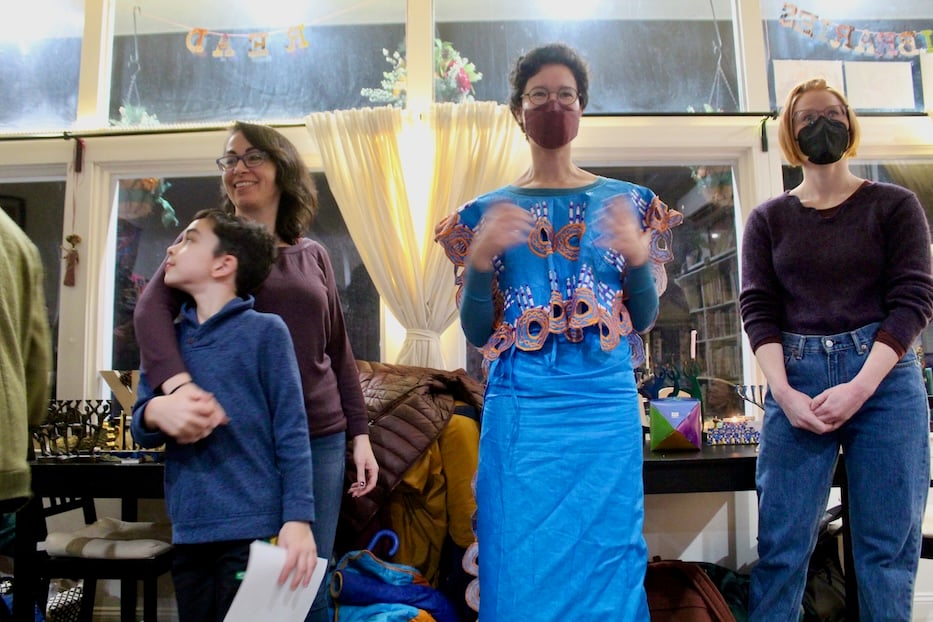
Rebecca Cohen and her son Lucas, May Ye, and Esther Rose-Wilen.
As night fell outside and people trickled into the space, that tension between light and darkness seemed to be everywhere. On the space's cozy chairs and couches, heavy coats multiplied, attendees catching up with each other and introducing themselves to new people. On tables by the street-facing windows, a few people set up their menorahs, with designs that ranged from a banana boat to a line of interlocking bronze dancers.
As the hum of chatter filled the space, Possible Futures founder Lauren Anderson set out candles emblazoned with a black-and-white pattern, an elder smiling gently from each beside lines of text promising to fight for Palestenian freedom.
Just past six, the first strains of "Lo Yisa Goy" called attendees to the front, where blessings over the candles and a short text study had been planned for the evening. As voices joined in, the song—which calls for its listeners of different nations to lay down arms and stop fighting—became a sort of cacophonous prayer. Since October, it has become part of a growing, worldwide grassroots movement calling for a ceasefire, often sung by groups like IfNotNow, Jewish Voices for Peace and Jews for Racial & Economic Justice.
As the room fell to a hush, Ye called up families to light the Hanukkah candles, the room suspended in prayer and candlelight. As musicians Josh Weinstein and Batya Kline rummaged for their instruments, the group prepared to flow back into "Lo Yisa Goy." This time, a gentle strumming from Kline's guitar accompanied them. Alongside it, Weinstein's trumpet rose into the air, the music traveling towards the low ceiling and weaving through the packed shelves of books and shoulder-to-shoulder crowd that had gathered inside.
It is, in some ways, a very un-Hanukkah anthem. Also referred to as the “Festival of Lights,” Hanukkah celebrates the second-century victory of Judah the Maccabee and his band of Jewish soldiers against the larger Seleucid or Greek army, during which they reclaimed and rededicated the Holy Temple in Jerusalem. As the story tells it, the group needed oil to relight the menorah, and found only a trace amount remaining. But instead of lasting for just one day, it fueled the menorah for eight, bringing light into the post-battle darkness and the religious lives that the Greeks had tried unsuccessfully to snuff out. In other words, it's a story about a nation taking up arms and rising up to vanquish its enemies.
"Lo Yisa Goy," meanwhile, has been largely understood and adopted as an anti-war ballad for over 50 years. Written by Shalom Altman in 1948, it is inspired by a passage in Isaiah 2:4 that reads "They will beat their swords into plowshares and their spears into pruning hooks." In the Middle East, that year marked the Arab-Israeli war and Nakba, or forced displacement of hundreds of thousands of Palestenians from their homes and their land. Over three decades later in 1986, it appeared in Shiron L'Shalom: A Sourcebook of Jewish Songs for Peace Education, alongside the once-Bundist ballad "Ale Brider" and Pete Seeger's "Ain't Gonna Study War No More" among other songs.
Thursday, Ye used it as an entry into discussion and study, speaking directly to the youngest members of the group as listeners of all ages chimed in. "What does that mean?" she asked, translating the lyrics of the song as she spoke. "What does that mean that nation shall not raise sword against nation?"
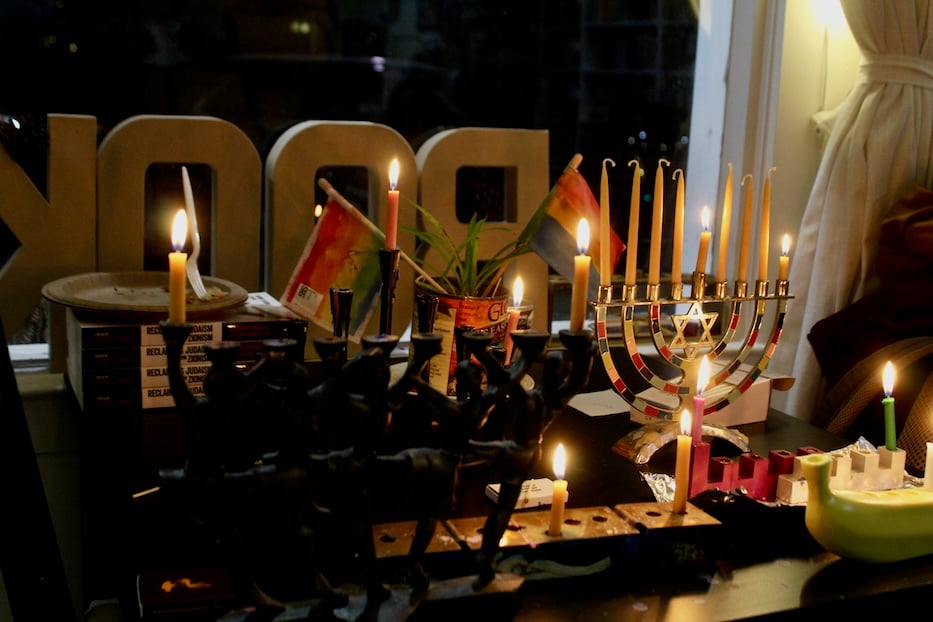
David Weinreb, a magnet resource teacher at Elm City Montessori School, suggested that it could be read as a warning against nationhood—the very sentiment at the core of Hanukkah. Kline, chiming in, remembered attending summer camp with former IDF soldiers who were now her counselors. It wasn't uncommon, she said, for them to teach some of the same tactics they'd learned during military service.
"It's great that we're in a space where we're not going to be teaching that kind of violence anymore," she said.
Lifelong New Havener Rebecca Cohen, who sits on the group's ritual committee, called it a reminder that violence will only beget more violence. At home and in ritual spaces, she and her son Lucas talk to each other about the war unfolding in Gaza, and the importance of both Israeli and Palestinian lives.
They don't shy away from "words that are relevant to war," she added—like "fighting" and "conflict"—or from brainstorming other ways to navigate entrenched conflict among groups that are in disagreement with each other. Lucas, who is eight, suggested a "Peace Table" where people can sit, speak with each other, and resolve conflict.
"It's about learning to have empathy for those you're in conflict with," offered Tagan Engel. "Even when you're hurt, it's about practicing empathy and radical love so that we're building a community based on love, and not on violence."
"Do any of the kids want to tell us what safety means?" Ye ventured, returning to the second part of the text.
"Being protected!" came a little voice from the right side of the room. "It means someone guards you."
"Or being helped by a friend!" chimed in Lucas.
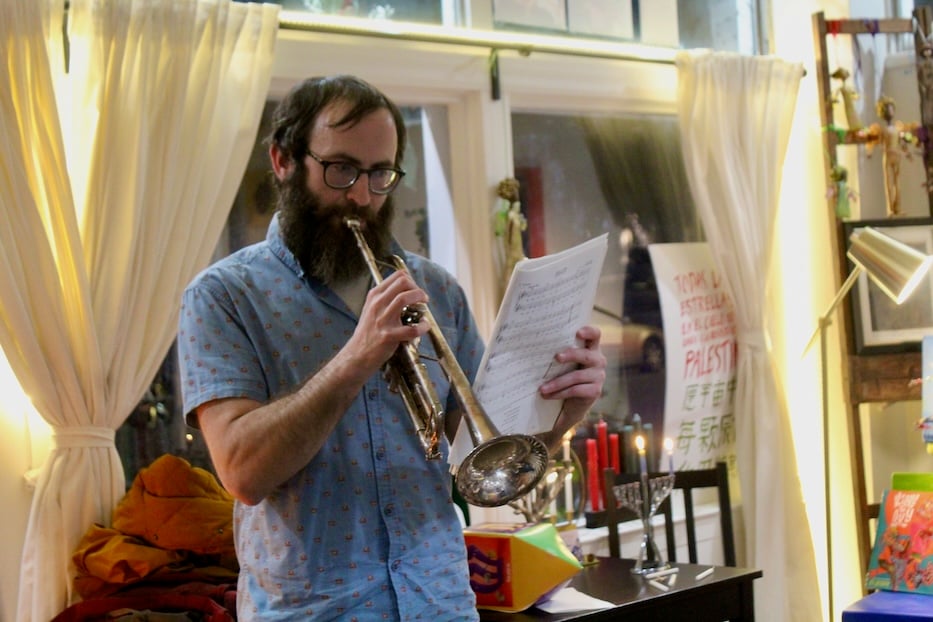
"I have a question," said Esther Rose-Wilen, a fellow member of the group's ritual committee. "What do you think the opposite of a sword is?"
"Your hands!" Lucas offered back. Moments later, Kline and Weinstein were playing the text study out with music that lasted in fits and starts well into the evening.
As attendees milled through the store, Kline said she was grateful for the space to ring in Hanukkah with other like-minded Jews. A first-year graduate student in ethnomusicology at Wesleyan University, Kline met Ye a year ago, while working on her undergraduate thesis. For about eight years, she said, she's been teasing apart what it means to identify as both Jewish and non-Zionist. This year, that has struck a particular chord as she watches Christian faith leaders cancel Christmas in Bethlehem.
"I think for me in terms of showing up and being in solidarity spaces, activism goes hand-in-hand with me being a devout Jew who prays every day," she said.
As she caught up with members of Mending Minyan, Cohen said that she's going into Hanukkah with a range of feelings, from deep grief to gratitude for her chosen community.
"Gatherings like this are a way of expressing what it looks like to deeply love Judaism and Jewish people and [also] stand in opposition to the genocide of Palestenians," she said.
"I'm holding a friend who is in his last days," added Lynn Colville, standing over a book display that included Abolition Is Love and Saving Our Own Lives, when asked what she'd brought with her into the space. "I'm holding my need to be around young children, teenagers. and a community that is not oppressing people. I'm holding simple conversations with people that I don't know. I'm creating a different way of doing something in a way that is safe and healthy for me."
.jpeg?width=933&height=622&name=MendingMinyanHanukkah23%20-%201%20(1).jpeg)
Candles that bookspace owner Lauren Anderson put out during the event. The designs come from a recent Crafters of Color fundraiser at Possible Futures.
Further back, the festivities showed no sign of stopping. Sugar, Possible Futures’ resident dog, padded around the tightly packed shelves and sets of legs before curling up in a bed beneath the checkout desk. Friends caught up with each other, nibbling on latkes as pint-sized celebrants toddled past them to a coloring station. From the front of the storefront, flames danced in unison with each other, welcoming in the holiday.
Lauren Anderson, who founded Possible Futures last year, said that she's always excited to host the group for a number of reasons, including that many of its members were some of her first supporters at the bookspace and its Whalley Avenue predecessor, People Get Ready Books. When People Get Ready opened in 2019, Lucas was one of the first kids to come run around the bookspace. A year ago, Ye helped her put books on shelves at the new space.
"I love and admire what they're building as a space," she said. "Sort of in the way that Toni Morrison would say, 'If there's a book that you want to read, but it hasn't been written yet, then you must write it,' like, if there's a need you want met, meet it. It's always felt to me, as someone who is not Jewish and does not have a spiritual home, really warm and welcoming and inclusive."
"It always feels like an honor to have them ask to gather in this space," she added. "And I think at this point, they just know that the answer is gonna be yes. I just appreciate them and what they bring to the space."

